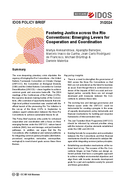
Fostering justice across the Rio Conventions: emerging levers for cooperation and coordination
Aleksandrova, Mariya / Aparajita Banerjee / Marcelo Inacio da Cunha / Jean Carlo Rodríguez de Francisco / Michael Brüntrup / Daniele Malerba (2024)
Policy Brief 31/2024
The Rio Conventions (UNFCCC, CBD, UNCCD) offer multilateral and national platforms for integrating justice to achieve sustainable futures for all and to meet shared goals across three emerging themes under the UNFCCC: nature-based solutions, loss and damage, and just transition pathways.